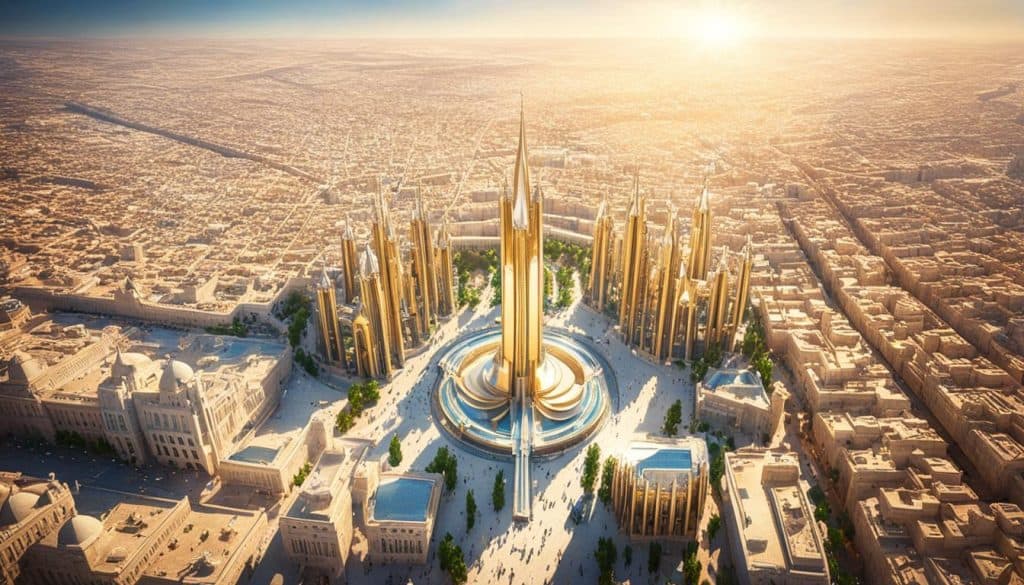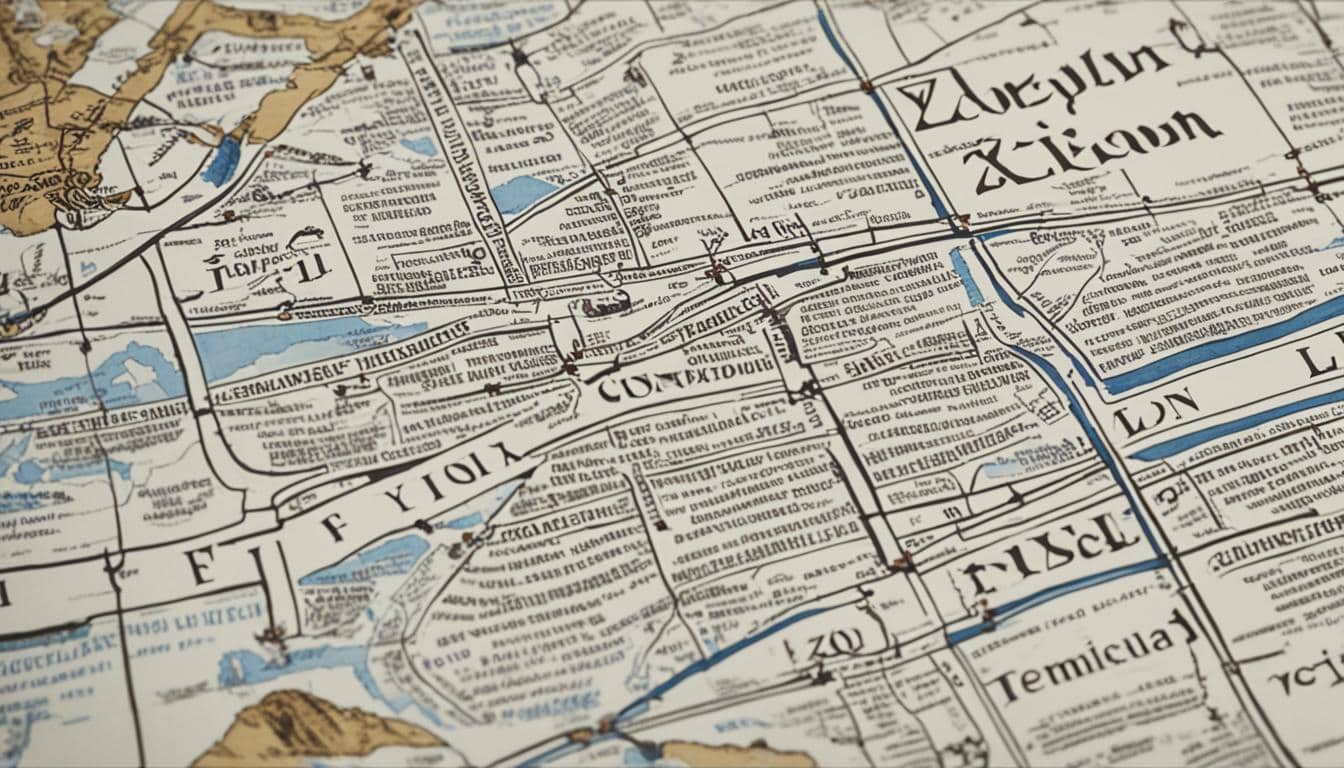Table of Contents
Ever thought about Zion’s role in shaping Christian and Jewish beliefs?
How has the idea of Zion changed our view of divine promises?
Let’s dive into how Zion’s legacy has deeply influenced both Christian and Jewish theology.
Zion as God’s Dwelling Place: Unveiling the Sacred Connection
Zion takes us to a place where God is close to His people. It shows us how we connect with the divine. The verses in Psalms 132:13-14 highlight Zion’s importance in Christian and Jewish beliefs.
Psalms 132:13-14 tells us, “For the Lord hath chosen Zion; he hath desired it for his habitation. This is my rest forever: here will I dwell; for I have desired it.” God cherishes Zion deeply. It’s His chosen place, where heaven and earth connect.
Zion feels like a spiritual home to believers. It’s where they meet the divine and feel His love and guidance. This place links heaven and earth, filling us with awe.
Understanding Zion lets us see its key role in our faith. It reminds us of God’s constant presence and our strong bond with Him. Zion calls us to come closer, seek God, and find peace in this sacred space.
“For the Lord hath chosen Zion; he hath desired it for his habitation. This is my rest forever: here will I dwell; for I have desired it.” – Psalms 132:13-14
Zion invites us to deepen our relationship with God. It’s a place where we find comfort, strength, and the knowledge that we’re never alone.
We’ll keep exploring Zion and its role in Christian and Jewish faiths. We’ll discover more about the divine promises it stands for.
Zion and the Messiah: Prophetic Insights into Jesus’ Ministry
We’re diving deep into how Zion’s legacy has shaped Christian and Jewish beliefs. Specifically, we will look at Zion in the New Testament. Here, it represents God living among His people.
Through the teachings of Jesus, we’ll see Zion’s role in prophecy and its link to the Messiah.
Isaiah 2:3 offers us a peek into the future. It says, “And many people shall go and say, Come ye, and let us go up to the mountain of the Lord, to the house of the God of Jacob; and he will teach us of his ways, and we will walk in his paths.”
This message hints at Jesus’ work. He brought the kingdom of God closer and welcomed everyone to follow Him.
“Come, let us go up to the mountain of the Lord.”
– Isaiah 2:3
Jesus spread the message about God’s kingdom and how we could live in His grace. He invited people to “come” and learn from God, much like the call to go up to Zion.
His words and deeds made the teachings of Isaiah real. They showed Zion as a symbol of God’s kingdom here on Earth.
Through his life, Jesus made Zion’s legacy come alive. He was God’s presence with His people, teaching and guiding them. He fulfilled the prophecies about Zion. This brought hope and salvation to all.
Next, we’ll see how Zion transforms in the book of Revelation. This reveals its crucial role in God’s plan to save the world.
The New Jerusalem: Zion’s Transformation in Revelation
Our exploration of Zion’s theological importance takes us to New Jerusalem’s breathtaking depiction in Revelation. John sees a new Zion in Revelation 21:2-3.
It’s a city gleaming with godly glory, God’s promised home. This heavenly city marks the peak of God’s saving acts and His pledges to His people.
Revelation shows Zion’s shift to a symbol of spiritual and divine nirvana. Believers find hope in this vision. It promises a future of living forever with God in His eternal realm.
“And I John saw the holy city, new Jerusalem, coming down from God out of heaven, prepared as a bride adorned for her husband. And I heard a great voice out of heaven saying, Behold, the tabernacle of God is with men, and he will dwell with them, and they shall be his people, and God himself shall be with them, and be their God.”
Revelation 21:2-3 (KJV)
The New Jerusalem stands as a majestic symbol of heaven and earth merging, God reuniting with His people. It shows God’s endless dedication to His creation and His wish for a perfect abode. Here, people fully feel God’s presence.
For believers, the New Jerusalem is their ultimate goal, satisfying their faith and deepest desires. It reminds us all earthly struggles will end. They’ll be replaced by everlasting happiness and peace with God.

Understanding Zion’s change in Revelation is key for Christians. The New Jerusalem underscores the heart of Jesus’ salvation efforts. It’s the forever home for the faithful.
In the New Jerusalem, Revelation’s Zion transformation highlights God’s constant love and loyalty. This heavenly city is a light of hope, urging believers to stay strong in faith. It promises a wonderful future with God.
| Symbol | Meaning |
|---|---|
| New Jerusalem | The ultimate dwelling place of God and the symbol of spiritual perfection. |
| Zion’s Transformation | The process of divine renewal and the establishment of God’s eternal kingdom. |
| Revelation | The unveiling of God’s redemptive plan and the fulfillment of His promises. |
Zion in the Beatitudes: Jesus’ Sermon on the Mount
We explore Jesus’ Sermon on the Mount in Matthew 5:1-12. It shows the link between the Beatitudes and Zion’s ideals. These blessings from Jesus show the core of His messages and the spiritual riches for His followers.
Zion represents divine favor and blessings, just like the Beatitudes show the path to happiness and spiritual wealth. Jesus talks about humility, caring, doing right, being pure, and making peace. These are Zion’s values.
- Zion: A symbol of God’s home, a light of hope and salvation.
- Beatitudes: Giving blessings to the gentle, those who need spirit, who seek what’s right, the kind, the clean of heart, the peace-makers, and those opposed for being right.
- Jesus’ sermon on the mount: A powerful speech that shares the steps of being a Christian and shows the kingdom of heaven.
The Beatitudes and Zion link in a special way. Jesus wants His people to have Zion’s virtues. By doing this, believers join in God’s realm. They enjoy being right, peaceful, and loved by God.
“Blessed are the meek: for they shall inherit the earth.”
“Blessed are the pure in heart: for they shall see God.”
“Blessed are the peacemakers: for they shall be called the children of God.”
Jesus’ dream for His people matches Zion’s hopes. It shows a way to spiritual fullness and a close relationship with God. By following the Beatitudes, we learn that true joy comes from living as Jesus taught and holding on to Zion’s promises.
The Lord’s Prayer and Zion: Seeking God’s Kingdom
When we think about Jesus’s lessons, there’s a deep link between the Lord’s Prayer and Zion. Jesus tells his followers in Matthew 6:10, “Thy kingdom come.”
This phrase is simple but deep. It connects strongly with Zion’s core ideas. It makes us want to find and live by God’s kingdom in our lives.
Through the Lord’s Prayer, Jesus teaches us to focus on bringing God’s kingdom to Earth. He connects our purpose with God’s great plan. The prayer is a reminder.
Seeking God’s kingdom is more than a goal – it’s a life-changing journey. It urges us to help make God’s rule a reality by living its values.
“Thy kingdom come” invites us to live by God’s kingdom’s ideals in our thoughts, actions, and everyday lives. It’s a challenge to show love, justice, mercy, and compassion, like God’s kingdom does.
Zion symbolizes a place of peace, harmony, and right living. It shows what happens when God’s promises come true and His kingdom is real on Earth.
Jesus added “thy kingdom come” to the Lord’s Prayer to highlight how crucial it is to work towards God’s kingdom. Zion’s hopeful idea matches this, inspiring us to aim for a world filled with justice, unity, and God’s presence.
Praying the Lord’s Prayer makes us think more deeply about our spiritual journey. It shows the strong link between our individual prayers and the big goal of God’s kingdom. It tells us that aiming for Zion isn’t just personal. It’s about everyone, everywhere, working to build God’s kingdom together.
Image:

Zion’s Enduring Hope: Connections in Pauline Theology
In Christian theology, Zion gets a new look through Apostle Paul’s writings. He shows us Zion’s ongoing hope.
Paul links Zion to his teachings in Galatians 4:26, calling the heavenly Jerusalem our “mother.” This symbolizes our spiritual inheritance through faith in Christ.
“But Jerusalem which is above is free, which is the mother of us all.” – Galatians 4:26
Paul highlights Zion as crucial to Christian faith. He sees the heavenly Jerusalem as our hope and spiritual legacy.
Zion, in Paul’s view, symbolizes endurance, hope, and God’s promises. It reminds us of Christ’s redeeming work and the glory awaiting believers.
Zion in Paul’s Letters
Paul refers to Zion and the heavenly Jerusalem to discuss spiritual truths. In Philippians, he talks about heavenly citizenship and waiting for Christ’s return.
“For our conversation is in heaven; from whence also we look for the Saviour, the Lord Jesus Christ.” – Philippians 3:20
This passage speaks to believers’ hope in God’s promises, tied to Zion. It shows our anticipation for Christ’s second coming.
Paul’s teachings urge us to focus on the heavenly Jerusalem and live by God’s kingdom values. This way, we share in Zion’s blessings while facing life’s trials.
Zion’s Legacy in Paul’s Vision
Paul sees the heavenly Jerusalem as key to understanding faith’s transformative power. Like Zion was God’s home in the Old Testament, believers now house the Holy Spirit.
By uniting with Christ, we join Zion’s spiritual community. We experience God’s presence and the Holy Spirit’s transformative work.
Paul shows Zion’s hope reaches beyond physical or temporal limits. It reaches all believers, crossing time and cultures.

Zion in the Psalms: Worship and Aspiration
The sacred Psalms show us a world of worship and dreams, all about Zion. Two Psalms, Psalm 48 and Psalm 87, give deep insights. They show why Zion is special for believers.
In Psalm 48, Zion’s beauty and power shine bright. It’s called the city of our God, a strong and forever safe place. Here, worshipers feel close to the Almighty. Through vivid pictures, the psalmist makes us feel happy about Zion. It stands for God’s promise and is our spiritual home.
“Beautiful for situation, the joy of the whole earth, is mount Zion… the city of the great King.” – Psalm 48:2
Psalm 87 sees Zion differently, as where the faithful start their journey. The psalmist says it’s a place where God chooses to bless and build His people. It shows Zion welcomes everyone, making it a home for all.
“And of Zion it shall be said, This and that man was born in her: and the highest himself shall establish her.” – Psalm 87:5
These Psalms are like invitations to worship, offering hope through Zion. They tell us Zion is more than a place. It’s a sign of God’s love and the answer to our deepest wishes.
Reflecting on these Psalms fills us with wonder and ambition. It turns our hearts to God, urging us to seek His promises in our lives.

Comparison of Zion in Psalm 48 and Psalm 87
| Psalm 48 | Psalm 87 |
|---|---|
| Emphasizes the splendor and majesty of Zion | Highlights the spiritual significance of Zion as the birthplace of the faithful |
| Invites worship and rejoicing in the beauty of Zion as the city of God | Illustrates the inclusivity of Zion, welcoming foreigners into the spiritual family |
| Portrays Zion as a symbol of divine promise and eternal security | Recognizes Zion as the place where God establishes His people |
How Do Different Interpretations of Zion’s Legacy Influence Christian and Jewish Theology?
The different interpretations of Zion’s legacy have a significant impact on Christian and Jewish theology. In Christian theology, the city of Zion holds great symbolic significance in New Testament narratives, representing both spiritual and earthly realms. On the other hand, in Jewish theology, Zion is seen as a central religious and cultural concept, symbolizing hope and connection to God.
The Suffering Servant and Zion: Isaiah’s Prophetic Vision
As we wrap up our journey through Zion’s history, we focus on a special link. This connection is between the Suffering Servant and Zion found in Isaiah’s vision. Isaiah 53 shows us the Suffering Servant, a figure who foreshadows Christ’s sacrifice.
Isaiah shares insights about Zion’s fate and its importance in the story of salvation. Like the Suffering Servant, Zion too has faced many challenges over the years.
Isaiah’s vision tells us the hardships of the Servant and Zion are meaningful. This suffering is a part of God’s plan to save humanity. With the Servant’s sacrifice, Zion becomes a source of hope and recovery, shining with God’s promise of salvation.
During our study, we’ve seen how Zion shapes Christian and Jewish beliefs, highlighting God’s promises and presence. Zion is known as God’s home, its future transformation, and its role in Jesus’ teachings.
This shows how important Zion is to our faith. Isaiah’s vision helps us see the lasting hope in Zion and how it’s linked to the Suffering Servant.




